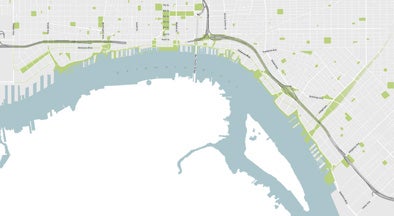Squilla hopes to finalize waterfront overlay legislation in mid-November

A zoning bill that would shape future development along the Central Delaware Waterfront could be finalized by mid-November, said First District City Councilman Mark Squilla.
Squilla has held meetings to discuss the language of the bill that would create the Central Delaware Overlay with representatives from the city planning department, the Delaware River Waterfront Corporation (which oversaw the creation of the city’s plan for the Central Delaware Master Plan, the city’s long-term vision for the revitalization of the waterfront), the Central Delaware Advocacy Group (whose members represent a host of waterfront civic and other organizations) and the Development Workshop Inc. (a development advocacy groups which represents the views of landowners and developers). The most recent meeting was last week.
The overlay would create an organized system for the principles of the Central Delaware Master Plan. The idea is that between the overlay and the underlying zoning, future development would fit in with the master plan. And conversely, development that did not fit in could not happen – at least not without a zoning variance or special ordinance.
The overlay has been in the works for a long time – Squilla had originally hoped it would be passed by city council previous to this past summer’s recess – at least in large part because master plan advocates and developers have each had concerns about the legislation.
In recent months, progress has been made. At this month’s CDAG meeting – which was held prior to Squilla’s most recent overlay discussion session – Chairman Matt Ruben reported that master plan advocates and the Development Workshop were near agreement on a means of stretching certain key neighborhood streets to the waterfront.
The Workshop opposed the original proposal, which called for literally extending the streets to the river, saying that some properties would be bisected in such a way as to make them unsuitable for development. CDAG opposed a later idea that would have required access, but via a path significantly more narrow than the street. Ruben said the working compromise is that development would have to leave a swath as wide as the water access streets, but the access route would not have to continue at the same angle at which the street meets Delaware Avenue. Two river access street – Berks and Mifflin– would be removed from the list, however. Berks would be replaced with a different street. CDAG planned to suggest Montgomery, said Ruben, who could not be reached for comment for this story.
Much discussion was also taking place regarding a building height cap. The Master Plan calls for a 100-foot limit, but allows for exemptions at the discretion of the Philadelphia City Planning Commission, which much approve plans of development for most Central Delaware projects. While some developers and CDAG have differed on the appropriateness of the 100-foot height limit, both the Development Workshop and CDAG wanted specific guidelines for the PCPC to apply when granting exceptions.
“We are moving toward a bonus system,” Ruben told the board. In other word, developers would be granted additional height above 100 feet for providing specific public benefits, such as putting up a green building or constructing the portion of the Central Delaware Trail that runs along the property.
Squilla said the bonus system is one area that is still being worked on. He said he has asked the planning commission to “make some changes for some of the bonuses” and determine how that will affect development.
Planning Commission Deputy Executive Director Eva Gladstein said the review of the bonus system had begun, but declined to provide details. She said she was not comfortable sharing any details on any aspects of the talks at this time, since they are still ongoing.
When asked what issues consensus has been reached on, Gladstein said she wasn’t comfortable doing that, either, because issues could potentially be re-opened in the process of reaching compromises on other items.
“I think the number of (open) issues have been narrowed down,” she said.
A proposed requirement for a waterfront setback has been a big point of contention.
In the past, the Development Workshop’s Craig Schelter has said requiring a setback without compensating landowners would amount to a public taking of privately owned land. He has also expressed concern about liability issues – if someone gets hurt on the trail running along a private property, who is responsible?
The need to address the liability issue is an area CDAG and the Development Workshop strongly agree on.
CDAG member Joe Schiavo said at the October CDAG meeting that they have been pushing the city to address this issue for a long time. “It’s something the city needs to step up,” he said. “If it is necessary that the city acquire land, if that is deemed the most fair, then the city needs to create a program to do so. It’s critical.”
Schelter was not available for an interview for this story, but said in an email that last week’s stakeholder meeting with Squilla moved issues forward.
“At this point all I can say is that it was a productive meeting, lots of issues discussed, lots of clarification language being considered,” he said. “The Planning Commission will be getting back to the group sometime after the election for further discussion.”
DRWC Project Manager Karen Thompson could not be reached for comment.
“We still have some work to do,” Squilla said. “We’re looking to probably meet again around Nov. 15 to hopefully finalize” the language.
Reach the reporter at kgates@planphilly.com
WHYY is your source for fact-based, in-depth journalism and information. As a nonprofit organization, we rely on financial support from readers like you. Please give today.



